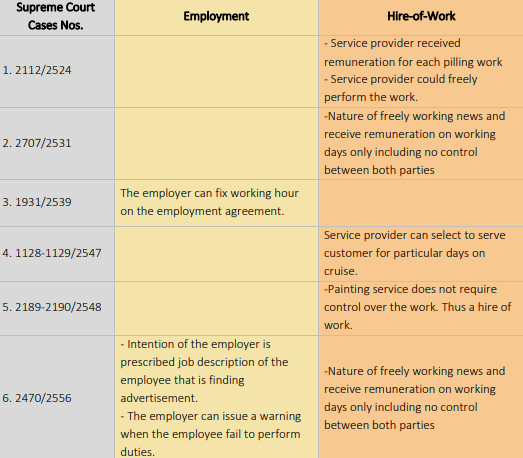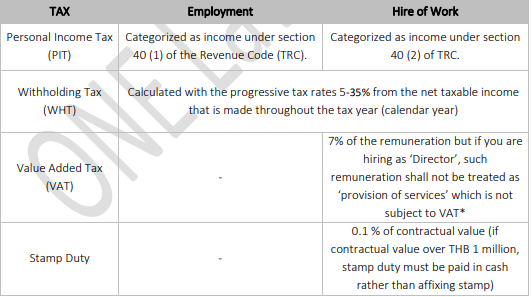Confusion between Employment vs Rent-of-Work
What is the difference between agency work and employment, and why is it important? It is about the power of control over the employee and the terms of payment. Even if the result of both transactions is the provision of work, the legal terms of temporary employment and employment are completely different.
Legal differences
employment The employment contract in Thailand is governed by the provisions of the Labor Protection Act (LPA) along with the Civil and Commercial Code (CCC), which defines an employment contract as a contract under which an employee agrees to provide services to another person called the employer who is obliged to pay remuneration for the work designated as wages as consideration for the duration of the services. The completion of the job can be an expectation in hiring a person, but the “PERSON” himself is the key to the transaction. When working under the employment contract, an employee can be appointed by the employer and duties or responsibilities can be shifted based on the employer’s request. Therefore, the employee must obey a statutory order from the employer. Otherwise the employee receives a warning from the employer. The employee can also be dismissed without payment of a severance payment if he does not fulfill his labor law and / or statutory obligations. On the contrary, in the event of an unlawful order from the employer, the employee has the right to refuse to act under that order. However, the employer cannot dismiss the employee for disobedience without prior notice.
In addition, the employer is generally liable for damage caused by the employee, provided that the employee performs the work for the benefit of and on behalf of the employer.
Only the provisions of the CCC apply, which define temporary employment as a contract in which a contractor or service provider undertakes to carry out a certain work for another freelance person without supervision or supervision and wish to receive remuneration in return for the work result . Therefore, the responsibility for any damage caused by the service rests with the service provider.
The concept of substance over form applies to most circumstances under Thai law, including the following. Although the title of the contract says “Employment” when the employer has no control over the employee. In addition, the focus is on the `RESULT OF WORK ‘. It is safe to say that this transaction is not an employment contract, but an employment contract.
In addition, the Supreme Court of Justice (Chamber of Labor) specifically decided in the 20171 case that these two transactions will be determined as follows:
In addition, we summarize the court ruling on these two transactions below for better understanding.

When you hire a ‘DIRECTOR’ of a company it can be either an employment contract or an employment contract. In Cases 1982 2 and 1981 3, the Supreme Court held that the director may be under an employment contract if:
1. receive wages as a fixed salary, not from attendance fees or management fees; and
2. work on behalf of the employer and be at work during working days and hours; and
3. Receive the welfare or benefits of workers like other workers.
Against this background, the key factors of “employment” tend to be control power, fixed pay, work at the employer’s workplace and work during working hours rather than “work result” or “getting the job done”.
Tax consequences
After all legal considerations have been completed, the tax implications should also be considered, as different situations can lead to different tax treatment, including tax burdens.

Therefore, the above legal terms and tax consequences for both employment and temporary employment must be taken into account for a clear legal and tax context.

